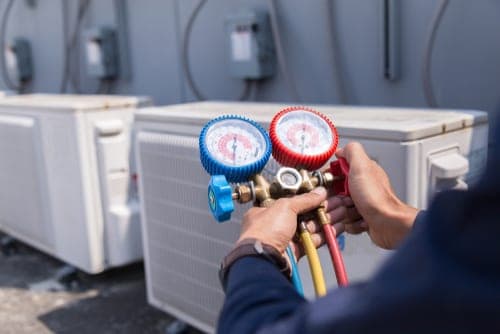Energy-Efficient Cooling And Heating Solutions to Save Money On Energy Expenses
As energy prices proceed to climb, the relevance of energy-efficient cooling and heating systems comes to be increasingly apparent. These systems not only assure substantial savings on energy expenses however likewise add to a much more sustainable future by minimizing energy intake. With various choices offered, consisting of geothermal heatpump and ductless mini-splits, homeowner face a plethora of selections that can enhance comfort and air high quality. Nevertheless, understanding the key attributes and upkeep requirements is vital to making the most of these advantages. What variables should be prioritized when selecting the best system for your demands?
Advantages of Energy-Efficient Heating And Cooling Equipments
Energy-efficient cooling and heating systems offer numerous benefits that prolong past plain cost savings. One considerable advantage is the reduced ecological effect. By consuming much less power, these systems add to reduce greenhouse gas discharges, helping to combat climate modification and promote sustainability. This aligns with raising social demands for environmentally friendly practices in domestic and industrial settings.
In addition, energy-efficient heating and cooling systems often offer improved convenience degrees. Most of these systems include sophisticated innovation that enables much better temperature level control and enhanced air quality (DMAKS HVAC). This brings about a healthier indoor atmosphere, which is particularly important for individuals with allergies or breathing concerns
Additionally, investing in energy-efficient cooling and heating systems can improve home worth. As even more customers focus on power performance, homes and structures equipped with these systems might draw in higher bids in the genuine estate market.
Sorts Of Energy-Efficient Cooling And Heating Options
Exactly how can home owners and services select the most appropriate energy-efficient HVAC choices for their demands? The market provides a variety of energy-efficient a/c systems, each developed to boost convenience while lessening energy consumption.
One alternative is the variable cooling agent circulation (VRF) system, which successfully manages the temperature in multiple zones within a building. This system adjusts its refrigerant circulation to match the preferred temperature level, leading to significant energy cost savings.
An additional prominent option is geothermal heatpump, which use the earth's secure temperature level to warmth and great rooms. By moving warm to and from the ground, these systems show impressive effectiveness, specifically in moderate climates.
Additionally, ductless mini-split systems offer an energy-efficient option for homes lacking ductwork. These systems enable zone-specific home heating and air conditioning, lowering power waste in unoccupied areas.
Last but not least, high-efficiency heaters and ac unit, with advanced SEER and AFUE rankings, provide trustworthy environment control while eating much less energy than standard designs. By assessing these options, property owners and services can select a HVAC system tailored to their details demands and power effectiveness goals.
Trick Functions to Consider

Following, investigate the kind of compressor made use of in the system. DMAKS HVAC. Variable-speed compressors can adjust their output to match the heating or cooling need, resulting in boosted comfort and power financial savings contrasted to single-speed versions. Additionally, look for systems furnished with smart thermostats that supply programmable setups and remote accessibility, permitting far better control over power intake
An additional essential attribute is the system's air purification capacity. High-efficiency filters can enhance indoor air top quality and lower power intake by making certain the system runs successfully. In addition, think about the kind of refrigerant made use of; contemporary systems frequently employ green cooling agents that have a lower environmental influence.
Finally, guarantee that the system works with zoning modern technology, which allows for customized temperature level control in various areas of your home, boosting comfort while minimizing energy use.
Tips for Picking the Right System


Next, take into consideration energy performance ratings, especially the Seasonal Power Effectiveness Proportion (SEER) for cooling down systems and the Yearly Gas Use Efficiency (AFUE) for home heating systems. Greater ratings show better effectiveness, which can result in check these guys out considerable financial savings on energy bills gradually.
Furthermore, review the kind of heating and cooling system that finest suits your way of life and spending plan. Choices consist of air conditioning, ductless mini-splits, and heat pumps, each with its own collection of benefits and moved here disadvantages.
Do not ignore the significance of proper installation and sizing; an incorrectly sized system can cause ineffectiveness and enhanced wear. Finally, speak with a professional a/c service provider to acquire professional suggestions tailored to your home's one-of-a-kind requirements. This detailed technique will certainly guarantee that you pick an energy-efficient a/c system that satisfies your requirements and budget properly.
Maintenance for Optimal Efficiency
As soon as the best a/c system remains in location, recurring maintenance becomes crucial to making certain ideal effectiveness and durability. A properly maintained system operates better, leading to reduced power intake and reduced utility expenses. Normal assessments and tune-ups need to be set up at least twice a year-- when prior to the cooling season and once before the heating season.

Property owners should likewise be alert concerning monitoring their HVAC system's performance. Uncommon sounds, changing temperatures, or boosted power bills can show underlying concerns that call for immediate interest. By resolving these issues immediately, house owners can stop expensive fixings and extend the life expectancy of their systems.
Purchasing a maintenance strategy with a certified professional not just boosts performance yet also offers assurance, recognizing that the system is running at its ideal. DMAKS HVAC. Routine upkeep is consequently vital for maintaining power efficiency and decreasing total functional prices
Conclusion
To conclude, energy-efficient a/c systems offer a practical service for minimizing energy expenses while improving comfort and air top quality. By including advanced technologies and options such as geothermal heatpump and ductless mini-splits, homeowner can accomplish considerable energy cost savings and add to environmental sustainability. Careful consideration of system features and recurring upkeep better makes certain ideal performance, making energy-efficient systems a sensible financial investment for both financial and environmental benefits.